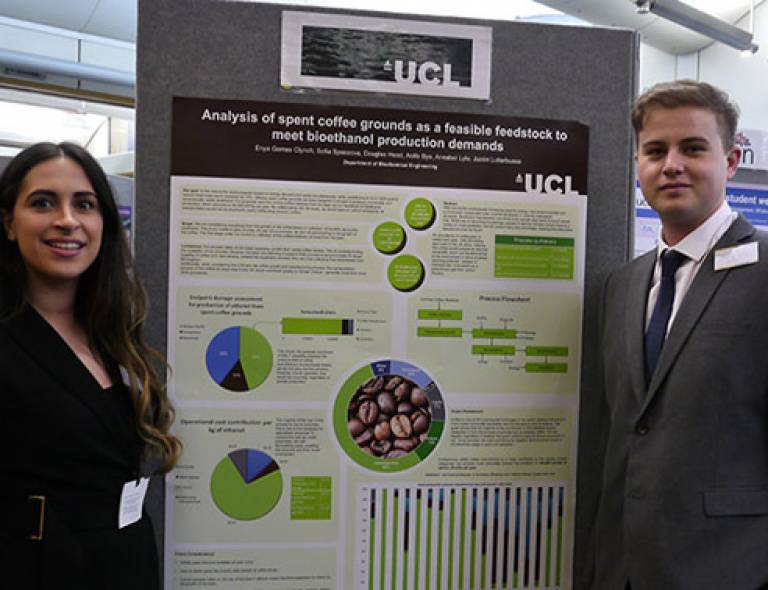Seven Questions with Dougie Head
6 December 2018
Dougie Head, a winner of UCL’s Posters in Cloisters, went on to present his research looking at coffee waste and bioethanol production at the national finals, Posters in Parliament, where he and his co-researcher shared their findings with Energy Advisor, Jack Miller.

Why are you interested in biochemical engineering and what do you plan to do in the future?
Biochemical engineering is everywhere but no one really knows it, it’s also basically impossible to explain. Every time you drink a beer: biochemical engineering, take an antibiotic: biochemical engineering, use water that’s been through a treatment plant: biochemical engineering. Looking at the future there’s so much that will (hopefully) come from this field too, from biofuels and upgrading waste, to advanced treatment methods for a variety of diseases.
For me moving into the future amongst all of this, there are so many pathways to take. I’m at somewhat of a mental crossroads in what I want to do. I would like to venture into sustainability, but whether this is through the development of biofuels or through process development to make a process more sustainable is currently in dispute.
Looking at biofuels, last year myself and a group of other students carried out a life cycle analysis of the production of bioethanol from spent coffee grounds. Coffee is the second most traded resource in the world and currently most of it goes to waste. If this could be utilised as an alternative feedstock for bioethanol production then the world’s reliance on fossil fuels could be eased. Following the initial investigation, myself and another student carried this project further looking into basing a life cycle analysis on lab-based study over summer.
What is the most interesting thing you’ve done, seen or got involved with while at UCL?
The lab based study into the production of bioethanol from spent coffee grounds was definitely the most interesting thing I’ve done since starting at UCL. It taught me a lot of things that you only learn when leading your own research, like experimental planning, and the fact that things go wrong. It also meant that I got to use a variety of equipment in our pilot plant that it’s unlikely I would have gotten to use properly otherwise.
Have you discovered any hidden gems’ during your time at UCL?
Tavistock Square, the one behind Gordon Square, that everyone has definitely walked past a hundred times. In summer months it’s really nice to go and sit in and is usually far less busy than Gordon Square.
Give us your top three things to do/see/go to in London
- Any open house you can go to, they’re usually amazing, especially anything that’s been either a government building or a royal residence at some point.
- Walk along the South Bank in the early evening and just enjoy the sunset and atmosphere.
- Newport Street Gallery, it always has something weird and wonderful being shown so definitely worth a visit.
If you were Provost for the day, what one thing would you do?
Everyone always gives sensible answers to this question. I’d probably organise a campus wide food fight or a huge paint party. Good job I’m not the Provost really.
Who inspires you and why?
My biggest inspiration for following a science path was my Grandfather who was a pioneer of his time and always encouraged all of his grandchildren in the pursuit of knowledge. From this my parents pushed me to do my best and have always been there for me.
Since I’ve been at UCL my department is full of inspirational people and most of them work in the background of industry, gradually making a difference to the world. If I can get to this point I will feel I have achieved much with my life.
What would it surprise people to know about you?
I really considered going into a culinary profession before I came to university, and very nearly did. Needless to say, I’m happy I didn’t as I feel I’ve found something that will interest me for the rest of my life and that will still be churning out new discoveries indefinitely.
Could you present your research to UK Parliament?
Submit your research poster to teaching.learning@ucl.ac.uk by 23 January 2019 to present at UCL Poster in Cloisters to be in with a chance to attend Posters in Parliament.
You need to present undergraduate work and either be a current undergraduate student at UCL, or have graduated in the last 12 months.
Templates and guidelines on research posters can be found here.
 Close
Close

